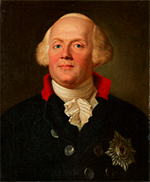Prussia: German Powerhouse for Centuries
Part 2: Continuum of Success
Prussia had varying degrees of success against the French armies of Napoleon Bonaparte in the next several years, losing handily at Jena and Auerstädt in 1806 but, after abandoning a treaty with France, playing a significant part in the Allied victory at Waterloo in 1815. As a result, Prussian gains from the postwar Congress of Vienna were significant. In that same year, Prussia formed the German Confederation, a loose collection of former German states that included Austria, with which Prussia served a dominant role. A further benefit for Prussia was the creation in 1834 of the Zollverein, or German Customs Union, to manage economic affairs across a wide spectrum. As in other European countries, the Revolutions of 1848 affected Prussia in a big way. In March, large crowds gathered in Berlin and made demands of King Frederick William IV. Among those demands were a constitution, parliamentary elections, and freedom of the press. The king agreed, but subsequent clashes between demonstrators and soldiers resulted in deaths and a wholesale battle ensued in the streets of Berlin. After a few days, the fighting stopped. The king made a show of marching through the streets to attend a funeral for those killed in the fighting. Next came an elected government, the Frankfurt Parliament, which had members from a number of German states. Set with the unenviable task of passing laws that would benefit all of the myriad German states, the assembly failed to generate any legislation. That assembly was dissolved, and another one, the Berlin Assembly, took its place. In December, however, the king broke up the assembly and declared a constitutional monarchy headed by a parliamentary government. Elected as the first head of the new parliament was Otto von Bismarck. King Wilhelm I in 1862 appointed Bismarck prime minister. In the years that immediately followed, he transformed a kingdom into an empire. Prussia allied with Austria in 1863 to fight Denmark for control of the Duchies of Schleswig and Holstein. The Danish defeat left Holstein for Austria and Schleswig for Prussia. Unsatisfied, the two major powers went to war with each other in 1866, and Bismarck's well trained army made quick of the Austrians. The resulting land transfers included Holstein, Hanover, Frankfurt, and other lands in what is now north central Germany. 
The Austro-Prussian War ended the German Confederation; in its place, Prussia put the North German Confederation, a similar entity of German states but without Austria. The government of the new confederation had a president and a chancellor and a two-house parliament, but Prussia had a controlling share of the votes in the upper house and so ran the show. Tensions over supremacy in Europe, along with a dispute over succession to the Spanish throne, led to a war with France, which Prussia won in a matter of weeks. Hard on the heels of that dominant performance, Germany proclaimed its Empire, on Jan. 18, 1871. With Germany united, Prussia was still the major power. Its prime minister was imperial chancellor several times, and Prussian money flowed throughout the empire. Becoming head of that empire in 1888 was Kaiser Wilhelm II, whose aggressive increase in numbers and power of the German navy angered other European powers, notably France and the United Kingdom. Germany had already joined Austria-Hungary and Italy in the Triple Alliance, a mutual defense association; to counter that, France and the U.K. joined Russia in the similarly constructed Triple Entente. The assassination of the Austrian Archduke Franz Ferdinand in 1914 tested the validity of those alliances, and all signatories responded violently and militarily, resulting in World War I. In the waning days of the war, Germany sustained a revolution, resulting in the abdication of Wilhelm II. Prussia then became a free state within the empire's successor, the Weimar Republic. The harsh Treaty of Versailles handed over to the Allied Powers a large amount of land that had belonged to Prussia. The republic tottered on for a time amid the Great Depression, then gave way to a coup in 1932 led by Reich Chancellor Franz von Papen. The Nazi takeover of Germany accelerated tensions throughout Europe and then aggressively began World War II. The Allied victory in that conflict led to more handovers of formerly Prussian lands. East Germany subsumed what was left, as did the unified German state in 1990. First page > Power Buildup > Page 1, 2 |
|
Social Studies for Kids
copyright 2002–2026
David White



 Two decades later, Prussia completed two further Partitions of Poland, amid the backdrop of revolutionary wars between France and monarchical European powers. It was
Two decades later, Prussia completed two further Partitions of Poland, amid the backdrop of revolutionary wars between France and monarchical European powers. It was 
